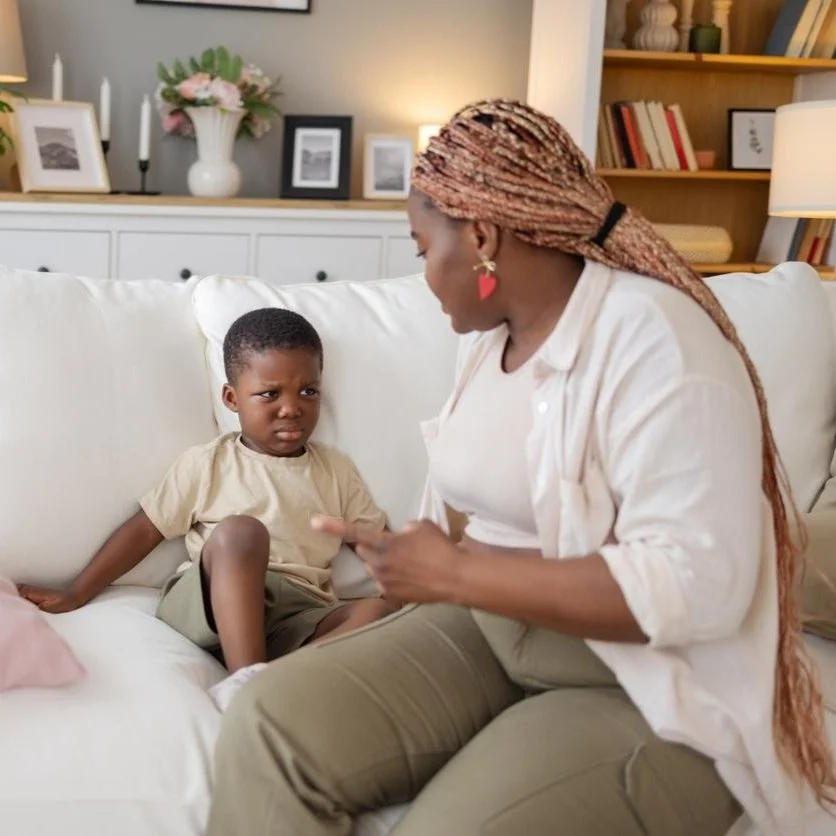Black and Brilliant: Overcoming the Imposter Within
Imposter syndrome uniquely impacts Black professionals, influenced by systemic racism, stereotypes, and the pressures of hyper-visibility in predominantly white spaces. We discuss it here!
Photo Credit: fotostorm via iStockPhoto.com
By: Jamila Gomez
Imposter syndrome, a psychological phenomenon where individuals doubt their accomplishments and fear being exposed as frauds, is pervasive across many demographics. However, it manifests uniquely and with particular intensity in the Black community, driven by systemic inequities, cultural expectations, and historical marginalization.
For Black professionals and individuals navigating predominantly white spaces, imposter syndrome is often exacerbated by the pressures of racial stereotypes and a constant need to prove their worth. From academia to corporate boardrooms, Black individuals frequently feel the unspoken burden of representing their race in environments where they may be one of the few—or the only—Black person present. This hyper-visibility amplifies self-doubt, as any perceived mistake or shortcoming risks reinforcing negative stereotypes rather than being seen as individual human error.
The roots of imposter syndrome in the Black community are deeply entwined with systemic racism. Historically, Black Americans have faced persistent barriers to education, employment, and wealth accumulation. These inequities contribute to an internalized narrative that success is a fragile anomaly rather than a rightful achievement. Even when Black individuals excel, societal biases can overshadow their accomplishments. Microaggressions, such as being told, “You’re so articulate,” or being mistaken for a less senior role, subtly undermine confidence and reinforce feelings of not belonging.
Additionally, the concept of “Black excellence”—while empowering—can contribute to imposter syndrome. The pressure to excel and exceed expectations as a means of combating stereotypes often leads to overwork and burnout. For some, the constant pursuit of perfection fuels an internal voice that insists their success is merely a façade, sustained only by extraordinary effort and luck rather than competence and merit.
Family and community dynamics can also influence imposter syndrome. Many Black individuals are the first in their families to achieve higher education or enter prestigious professions. While these achievements are celebrated, they often come with a sense of isolation and guilt, as well as the pressure to pave the way for others. The weight of generational expectations, coupled with the external challenges of systemic racism, can foster a sense of inadequacy and fear of failure.
Addressing imposter syndrome in the Black community requires a multifaceted approach. On a personal level, cultivating self-awareness and seeking therapy can help individuals reframe their internal narratives. On a broader scale, workplaces and institutions must actively create environments where Black individuals feel seen, valued, and supported. This includes implementing mentorship programs, addressing implicit biases, and fostering diversity at all levels of leadership.
Recognizing the structural roots of imposter syndrome in the Black community is essential. Only through systemic change and collective support can we dismantle the barriers that perpetuate self-doubt and empower individuals to fully embrace their worth.
YOU MAY ALSO BE INTERESTED IN:
SHARE TO SOCIAL MEDIA
Spare the Rod?: The Effects of Discipline on Black Children
Understanding the cultural and systemic factors influencing discipline for Black children highlights the importance of empathetic and equitable practices that nurture growth and resilience. We discuss it here!
Photo Credit: PixelsEffect via iStockPhoto.com
By: Jamila Gomez
Discipline plays a significant role in shaping children’s lives, instilling values, and guiding behavior. For Black children, the effects of discipline are deeply influenced by the historical, social, and cultural contexts that inform their upbringing. Understanding how discipline impacts Black children requires exploring both its potential benefits and pitfalls, especially within the framework of systemic challenges and cultural strengths.
Cultural Foundations of Discipline in Black Families
In many Black households, discipline is seen as a tool to prepare children for the realities of a world that can be harsh and unforgiving. Historically, Black parents have faced the dual burden of teaching their children respect and self-regulation while shielding them from systemic racism. For many, discipline becomes a strategy to help children navigate a society where minor missteps can have disproportionately severe consequences. This emphasis on structure, respect, and accountability is often rooted in love and the desire to ensure survival in a world fraught with inequities.
The Positive Impacts of Discipline
When applied thoughtfully, discipline can empower Black children with life skills like resilience, self-control, and responsibility. Structured environments and consistent expectations can help children develop a sense of agency, boosting academic and social outcomes. Discipline rooted in cultural affirmations and open communication fosters self-confidence, cultural pride, and the ability to withstand societal pressures.
Community-oriented discipline, which includes guidance from extended family and mentors, offers additional support. This collective approach—rooted in African and African-American traditions—teaches children the value of interdependence, mutual accountability, and cultural heritage.
The Risks of Harsh or Misapplied Discipline
However, discipline can have adverse effects when it is overly punitive or harsh. Research indicates that Black children are more likely to experience corporal punishment than their peers, both at home and in school. While some view this as a culturally normative practice, excessive or inconsistent discipline can lead to feelings of fear, resentment, or low self-esteem. These outcomes are exacerbated when discipline is devoid of positive reinforcement or explanation, leaving children feeling misunderstood rather than guided.
In schools, Black children are disproportionately subjected to exclusionary disciplinary actions, such as suspensions or expulsions. This systemic bias can undermine their academic progress and contribute to the school-to-prison pipeline. When authority figures perceive Black children as older or less innocent than their peers, disciplinary actions often reflect these biases, perpetuating cycles of inequality.
Striking a Balance
To maximize the benefits of discipline while minimizing harm, it is essential to adopt culturally responsive approaches. Practices that emphasize empathy, understanding, and restorative justice can address misbehavior while affirming the child’s dignity. Black parents, educators, and communities must advocate for approaches that balance accountability with compassion, recognizing the unique challenges Black children face.
In conclusion, discipline can be a powerful tool for nurturing growth, but its effects depend on its application. By fostering supportive, culturally aware, and equitable practices, we can ensure that discipline serves as a pathway to empowerment, not oppression.
YOU MAY ALSO BE INTERESTED IN:
SHARE TO SOCIAL MEDIA
Celebrating Black Womanhood Through Holistic Self-Care Routines
Prioritizing holistic self-care allows Black women to nurture their mind, body, and soul while reclaiming joy, rest, and identity in a society that often overlooks their well-being. We discuss it here!
Photo Credit: DragonImages via iStockPhoto.com
By: Jamila Gomez
Black women embody resilience, beauty, and strength, often carrying the weight of their families, communities, and the world on their shoulders. Yet, in a society that frequently overlooks their well-being, prioritizing self-care becomes not only a radical act but a necessary one. Holistic self-care, which nurtures the mind, body, and soul, provides a pathway for Black women to reclaim their peace, honor their heritage, and celebrate their unique identities.
Mindful Healing
Mental health is often stigmatized in Black communities, but prioritizing mental wellness is vital. Journaling, for example, allows Black women to document their thoughts, dreams, and affirmations. Creating a gratitude practice through daily writing can help shift focus to joy and abundance. Meditation and mindfulness practices, particularly those guided by Black instructors, can offer a culturally affirming space for relaxation and self-reflection. Apps like Liberate, designed by and for Black communities, provide resources to meditate with cultural understanding.
Nourishing the Body
A holistic self-care routine celebrates the physical body as a temple. Movement like yoga, African dance, or even daily walks not only improves physical health but also connects Black women to ancestral traditions. Skincare and haircare routines can double as moments of meditation and pride, celebrating natural textures and melanin-rich skin. For example, creating a DIY shea butter mixture infused with essential oils like lavender or peppermint transforms a simple ritual into a deeply personal act of self-love.
Cultural and Spiritual Roots
Spirituality has always been a cornerstone of Black womanhood. Honoring this connection can involve practices like lighting candles, burning sage, or creating an altar dedicated to ancestors. These rituals ground Black women in their history, celebrating their lineage while offering a moment of spiritual reflection. Music, whether gospel, Afrobeats, or neo-soul, can serve as a meditative tool to connect with both inner strength and cultural identity.
Community Care as Self-Care
For Black women, self-care also extends to collective care. Joining sister circles, attending wellness retreats, or engaging in community activism reminds them they are not alone. Sharing joys, struggles, and wisdom within these spaces reaffirms the power of sisterhood and interconnectedness.
Holistic self-care for Black women is more than just a series of practices—it’s a reclamation of joy, rest, and identity. By centering their own needs and celebrating their unique heritage, Black women can cultivate a self-care routine that uplifts, heals, and empowers.
YOU MAY ALSO BE INTERESTED IN:
SHARE TO SOCIAL MEDIA
Exploring the Impact of Racism on Black Health Outcomes
Systemic racism and economic disparities significantly impact Black communities' health outcomes, leading to inequities in healthcare access, treatment quality, and chronic stress-related illnesses. We discuss it here!
Photo Credit: PeopleImages via iStockPhoto.com
By: Jamila Gomez
Racism, both systemic and individual, has a profound impact on the health outcomes of Black communities. This influence is not only visible in direct discriminatory actions but also in the broader socioeconomic factors that shape the lives and health of Black individuals. The disparities in health outcomes between Black populations and their white counterparts are stark, highlighting a troubling aspect of inequality that extends into the realm of public health.
Firstly, systemic racism results in unequal access to healthcare services. Black individuals often face significant barriers to healthcare, including fewer hospitals and clinics in predominantly Black neighborhoods, lower rates of health insurance coverage, and less access to emergency services. This lack of access contributes to higher rates of morbidity and mortality in these communities. For example, the COVID-19 pandemic disproportionately affected Black populations, not only because of greater exposure and less access to healthcare but also due to prevalent comorbidities that stem from reduced healthcare access over lifetimes.
Economic disparities further exacerbate these health inequities. Poverty, which affects Black communities at a higher rate due to historical and ongoing racial discrimination, is closely linked to poorer health outcomes. Economic hardship limits access to nutritious food, safe housing, and quality education—all factors that directly influence health. The stress associated with financial instability also takes a significant toll, contributing to higher rates of hypertension, diabetes, and mental health disorders among Black individuals.
Moreover, the psychological impact of experiencing or even anticipating racial discrimination can lead to chronic stress, known as “weathering.” This term describes the wear and tear on the body that occurs when individuals are exposed to prolonged stress. Weathering can lead to a host of health issues, including but not limited to cardiovascular disease, autoimmune disorders, and premature aging. The constant vigilance that Black individuals must maintain in a society rife with racial bias contributes to a heightened state of stress, which physiologically undermines health.
The quality of care received by Black patients is also a critical concern. Studies have shown that Black patients are less likely to be given appropriate medical tests and treatments compared to their white counterparts. There are documented cases of physicians underestimating the physical pain of Black patients, leading to inadequate pain management and suffering. This bias in treatment not only affects the quality of healthcare received but also erodes trust between Black patients and the medical system, discouraging individuals from seeking care when needed.
Addressing these disparities requires a multifaceted approach. Policymakers must work to eliminate barriers to healthcare access, ensure equitable distribution of resources, and enhance the cultural competency of healthcare providers. Additionally, addressing broader socioeconomic inequalities and educating the public on the effects of racism are vital steps towards mitigating its impact on health.
The health disparities experienced by Black communities are a clear indicator of the pervasive effects of racism. As society strives to achieve equity, understanding and addressing the health impacts of racism is crucial. Only through concerted efforts can the tide be turned toward a healthier, more equitable future for all.
YOU MAY ALSO BE INTERESTED IN:
SHARE TO SOCIAL MEDIA
Black Women Deserve Grace, Not Criticism
Black women face exhausting double standards in appearance, behavior, and cultural expression, highlighting society's need to dismantle biases and celebrate authenticity. We discuss it here!
Photo Credit: Rawpixel via iStockPhoto.com
By: Jamila Gomez
Black women often endure a unique and exhausting double standard in how their actions, appearance, and behavior are judged compared to women of other races. Despite their resilience and contributions to culture, society, and history, they are frequently ridiculed for things that are celebrated or overlooked when displayed by others.
One of the most glaring examples of this double standard lies in the policing of Black women’s physical appearance. Hairstyles like braids, afros, or locs, which are deeply rooted in Black culture, are often labeled as “unprofessional” or “unkempt” in corporate settings. Meanwhile, these same styles, when adopted by non-Black women, are praised as “edgy” or “trendy.” Similarly, Black women are criticized for their naturally curvier bodies or voluptuous figures, often labeled as “too sexual” or “inappropriate.” Yet, when others undergo cosmetic procedures to mimic these features, it’s deemed desirable and aspirational.
Black women’s assertiveness is also subject to an unfair lens. When they speak up for themselves or express strong opinions, they are often branded as “angry” or “aggressive.” This harmful stereotype of the “angry Black woman” minimizes their voices, making them hesitant to advocate for themselves in professional or personal settings. In contrast, women of other races who exhibit the same assertiveness are more likely to be seen as confident and empowered.
Even in parenting, Black women face harsher judgment. Single Black mothers are disproportionately stigmatized and blamed for societal issues, despite many demonstrating incredible strength and resourcefulness. Conversely, single mothers from other backgrounds often receive sympathy and support, with their struggles seen as individual challenges rather than moral failings.
Additionally, Black women are frequently ridiculed for their cultural expressions, from their vernacular to their style. Terms like “ghetto” are used to demean behaviors or aesthetics that are intrinsic to Black communities, only for those same traits to become celebrated when co-opted by others.
This constant scrutiny creates a societal burden that forces Black women to overperform in nearly every aspect of life just to be granted basic respect. While society has made progress in recognizing these disparities, there is still a long way to go in dismantling the biases that perpetuate these double standards. Black women deserve to live authentically, without fear of judgment for simply being themselves.
YOU MAY ALSO BE INTERESTED IN:
SHARE TO SOCIAL MEDIA
Feeding the Need: Craving Human Connection When You’re Not a People Person
Learn how introverts can balance craving human connection and valuing solitude through intentional strategies for meaningful relationships and self-care. We discuss it here!
Photo Credit: LaylaBird via iStockPhoto.com
By: Jamila Gomez
Craving human connection is a universal experience. Even those who identify as introverts or “not a people person” can feel the need for meaningful relationships and interactions. However, this desire often clashes with the natural tendency to avoid social situations. If you’re someone who values solitude but occasionally yearns for connection, here are strategies to balance these conflicting needs.
1. Embrace Your Desire for Connection
It’s important to acknowledge that wanting human connection doesn’t mean you’re suddenly outgoing or have to change who you are. Human beings are wired for relationships, even if they look different for everyone. Accept that your craving for connection is natural and doesn’t contradict your preference for alone time.
2. Opt for One-on-One Interactions
Large group settings can feel overwhelming, so prioritize one-on-one or small, intimate connections. Spending time with a close friend or family member can be fulfilling without being draining. A quiet coffee date or a walk in the park allows for meaningful connection without the chaos of group dynamics.
3. Explore Online Communities
The digital age offers countless opportunities to connect with like-minded individuals without the pressure of face-to-face interaction. Join online forums, social media groups, or virtual meetups that align with your interests. This allows you to engage in conversations and build connections at your own pace.
4. Practice Active Listening
If socializing feels intimidating, focus on listening rather than carrying the conversation. People appreciate being heard, and this can reduce the pressure to perform or entertain during interactions. Simply being present and attentive can create strong connections without feeling overwhelming.
5. Set Boundaries
Balancing connection and solitude means knowing your limits. Plan social activities with clear boundaries in mind, such as the duration of the interaction or the type of activity. Give yourself permission to leave when you feel drained and recharge afterward.
6. Engage in Shared Activities
Activities like volunteering, book clubs, or hobby-based groups allow for connection in a low-pressure environment. Shared goals or interests can make interactions feel more organic and less forced.
Craving human connection doesn’t mean you have to abandon your introverted tendencies. By taking small, intentional steps and setting boundaries, you can foster meaningful relationships while honoring your need for alone time. Connection is about quality, not quantity—so seek interactions that nourish you, even in small doses.
YOU MAY ALSO BE INTERESTED IN:
SHARE TO SOCIAL MEDIA
Overcoming Trust Issues: How to Build Healthy Foundations After Betrayal
Healing from betrayal involves rebuilding trust in yourself, practicing open communication, and fostering relationships rooted in respect and honesty. We discuss it here!
Photo Credit: LaylaBird via iStockPhoto.com
By: Jamila Gomez
Betrayal can be one of the most emotionally painful experiences, leaving scars that make trusting again feel impossible. Whether it stems from a romantic relationship, friendship, or family ties, betrayal shakes the very foundation of trust, creating feelings of vulnerability, anger, and fear. However, it’s important to remember that healing is possible, and trust can be rebuilt—not just with others but within yourself.
Acknowledge and Process the Pain
The first step in overcoming trust issues is acknowledging your emotions. Suppressing feelings of betrayal often leads to prolonged resentment or self-doubt. Journaling, speaking with a trusted confidant, or seeking therapy can provide safe outlets to process these emotions. By naming the hurt and recognizing its source, you begin the journey of self-awareness and healing.
Rebuild Trust in Yourself
Betrayal often leaves people questioning their judgment. Did I miss the signs? Was I too trusting? Rebuilding trust in yourself is crucial before attempting to trust others. Focus on strengthening your intuition and decision-making skills. Set boundaries that protect your emotional well-being, and learn to listen to your instincts. When you trust yourself, you’re better equipped to trust others.
Communicate Openly and Honestly
Healthy relationships are built on clear, honest communication. If you’re working on repairing trust with someone who betrayed you, have open conversations about what happened and what needs to change. Be clear about your boundaries and expectations moving forward. If they’re genuinely remorseful, their actions should align with their words over time.
Be Patient with the Process
Rebuilding trust takes time, and it’s not a linear journey. It’s normal to feel cautious or experience setbacks. Be patient with yourself and others. Celebrate small wins, like being able to share your feelings or take a leap of faith in a new relationship.
Focus on Relationships Built on Mutual Respect
While rebuilding trust, prioritize relationships where respect, empathy, and accountability are present. Surround yourself with people who value honesty and demonstrate reliability through consistent actions.
The Power of Forgiveness
Forgiveness doesn’t mean forgetting or excusing the betrayal; it’s about releasing the emotional burden it holds over you. By forgiving, you reclaim your peace and pave the way for new, healthier connections.
Healing from betrayal isn’t easy, but it’s possible. With time, effort, and a commitment to self-growth, you can overcome trust issues and lay the groundwork for healthier, more fulfilling relationships.
YOU MAY ALSO BE INTERESTED IN:
SHARE TO SOCIAL MEDIA
Falling Back in Love with Yourself After a Toxic Relationship
Reclaim your self-worth after a toxic relationship by embracing self-awareness, self-care, and self-compassion to fall back in love with yourself. We discuss it here!
Photo Credit: jacoblund via iStockPhoto.com
By: Jamila Gomez
Emerging from a toxic relationship can feel like escaping a storm—disoriented, drained, and unsure of who you are anymore. Toxic relationships often chip away at your self-esteem and self-worth, leaving behind emotional scars. However, while the aftermath may feel overwhelming, this period also offers a powerful opportunity: the chance to fall back in love with yourself.
The journey begins with self-awareness. Toxic relationships often blur boundaries and leave you questioning your own identity. Start by reconnecting with your likes, dislikes, passions, and values. What makes you happy? What lights you up? Reflect on what you’ve learned from the experience—both about yourself and the relationship. Forgive yourself for any perceived mistakes and understand that choosing yourself now is an act of courage.
Next, focus on self-care. Toxic relationships can erode your physical and mental well-being, so prioritize healing both. Whether it’s nourishing your body with nutritious food, engaging in physical activity, or simply getting enough rest, take small, consistent steps to care for yourself. On an emotional level, explore mindfulness techniques like journaling, meditation, or therapy. These tools can help you process your feelings, build resilience, and rediscover your inner strength.
Another key aspect of falling back in love with yourself is setting boundaries. Toxic relationships often involve a lack of healthy boundaries, so relearning how to protect your energy is crucial. Establish clear limits in your personal and professional relationships, ensuring that you prioritize your own needs and well-being.
Rebuild your confidence by rediscovering the things you’re good at. Maybe you’ve always been a great cook, a talented artist, or a thoughtful listener. Engaging in hobbies or learning something new can help you regain a sense of accomplishment and self-worth.
Finally, practice self-compassion. Falling back in love with yourself is not an overnight process. There will be days when self-doubt creeps in, but remember that healing isn’t linear. Speak to yourself with kindness and patience, as you would a close friend. Celebrate small victories along the way, no matter how minor they may seem.
Reclaiming yourself after a toxic relationship is a profound act of self-love. With time, you’ll not only heal but also come to appreciate your strength, resilience, and capacity for growth. This new chapter is yours to write—and you’re worth every ounce of love you give yourself.
YOU MAY ALSO BE INTERESTED IN:
SHARE TO SOCIAL MEDIA
How Self-Love Shapes Romantic Love in the Black Community
Prioritizing self-love in the Black community fosters healthier relationships by addressing generational trauma, promoting self-worth, and strengthening the foundation for authentic and resilient Black love. We discuss it here!
Photo Credit: Delmaine Donson via iStockPhoto.com
By: Jamila Gomez
Self-love is a profound foundation for healthy relationships, especially within the Black community, where historical challenges and systemic oppression have created unique barriers to both individual and collective healing. When individuals prioritize self-love, they cultivate an internal sense of worth and resilience, which profoundly influences their ability to give and receive love in romantic relationships.
For centuries, Black love has served as a radical act of defiance and survival, preserving joy and connection despite external adversities. However, self-love—a deeply personal and transformative practice—strengthens this legacy by fostering emotional well-being and breaking cycles of generational trauma. When Black individuals embrace self-love, they affirm that they are deserving of compassion, respect, and care—cornerstones of any healthy romantic partnership.
One of the ways self-love manifests in romantic relationships is through boundary-setting. Often, societal stereotypes and systemic inequities have pressured Black individuals to overextend themselves emotionally and physically, sometimes leading to unhealthy dynamics in relationships. When self-love is prioritized, individuals are more likely to establish boundaries that protect their mental and emotional health. In turn, this creates space for equitable and respectful romantic connections, where both partners feel seen and valued.
Moreover, self-love helps dismantle harmful patterns shaped by internalized racism, colorism, and negative self-perception. Within the Black community, unlearning these societal impositions is an act of self-care that directly impacts how individuals choose partners and navigate intimacy. When people accept their full selves—embracing their unique beauty, culture, and experiences—they are more likely to attract relationships rooted in authenticity and mutual respect.
Black love thrives when it emerges from a place of wholeness, rather than seeking completion in another person. Couples who prioritize self-love individually often bring emotional stability and self-awareness into their partnerships. This not only deepens their connection but also sets an example for future generations, emphasizing that love starts within.
In the Black community, self-love is not just a personal journey—it’s a communal one. By prioritizing self-care, self-respect, and self-acceptance, individuals contribute to a collective healing process that uplifts relationships and challenges narratives of unworthiness. Ultimately, self-love nurtures romantic love, empowering Black couples to build lasting, fulfilling connections that reflect the strength and beauty of their shared heritage.
YOU MAY ALSO BE INTERESTED IN:
SHARE TO SOCIAL MEDIA
Therapy in Black Relationships: Breaking Stigmas Around Mental Health and Love
Therapy is helping Black couples break cultural stigmas, heal generational wounds, and build stronger, healthier relationships rooted in love and understanding. We discuss it here!
Photo Credit: Prostock-Studio via iStockPhoto.com
By: Jamila Gomez
In Black communities, mental health conversations have often been overshadowed by cultural stigmas, societal pressures, and generational trauma. When it comes to Black relationships, these barriers can create cycles of misunderstanding, unhealed wounds, and emotional disconnection. However, therapy is increasingly being embraced as a tool to strengthen love, foster communication, and heal both individually and collectively.
For decades, therapy has been stigmatized in Black communities, often perceived as a sign of weakness or something only “crazy” people pursue. This misconception has been compounded by systemic racism within the mental health field, a lack of culturally competent therapists, and the idea that faith or family should be enough to address emotional struggles. These attitudes often find their way into relationships, where vulnerability is seen as a liability rather than a strength. Many couples internalize pain, resort to silence, or repeat unhealthy patterns they’ve inherited, leading to fractured relationships.
However, as conversations about mental health become more mainstream, Black couples are beginning to see therapy as a powerful resource for cultivating healthy, lasting love. Therapy provides a safe space to unpack individual traumas and explore how these impact the dynamics of a relationship. For example, a partner who grew up in a household where emotions were suppressed might struggle to communicate their needs, while the other may feel neglected or misunderstood. A therapist can help couples identify these patterns, develop empathy, and practice new ways of relating to one another.
Importantly, therapy doesn’t mean a relationship is broken. Many Black couples are using therapy proactively, not as a last resort. Premarital counseling, for instance, allows partners to align on values, expectations, and conflict resolution strategies before problems arise. Others turn to therapy to heal from specific challenges, like infidelity, financial strain, or unresolved grief.
The rise of Black therapists and culturally sensitive approaches to mental health care has also played a key role in breaking these stigmas. Black couples now have greater access to professionals who understand the nuances of their experiences, including racism, cultural identity, and the intergenerational effects of systemic oppression.
Ultimately, therapy is an act of love—for self and for each other. By normalizing seeking help, Black couples can break cycles of pain and create a legacy of healthy, resilient love. Healing together is not only possible but revolutionary.
YOU MAY ALSO BE INTERESTED IN:
SHARE TO SOCIAL MEDIA
Starting Over: The Glow-Up You Didn’t Know You Needed
Starting over isn't a setback; it's a powerful opportunity to reinvent yourself, drop unnecessary baggage, and embrace new possibilities that lead to growth, resilience, and your ultimate glow-up. We discuss it here!
Photo Credit: PeopleImages via iStockPhoto.com
By: Jamila Gomez
Let’s keep it real—starting over can feel scary as all get-out. You’ve got to leave behind what’s familiar, even if it wasn’t all that great, and step into the unknown. But here’s the thing: starting fresh isn’t a setback; it’s a setup for something better. When life hits you with the “reset” button, that’s your chance to level up, boss up, and rewrite your story the way you want it told.
New beginnings? They’re not a punishment. They’re a blessing in disguise. Let’s break it down—here’s why starting over could be the best thing that ever happened to you.
1. A Fresh Start = A Fresh You
Starting over is like getting a new pair of shoes —you feel lighter, fresher, and ready to step out with confidence. You get to shed all the stuff that’s been holding you back—old mistakes, toxic energy, or even just the version of yourself that didn’t feel like you.
Think of it like this: you’re not starting from scratch; you’re starting from experience. You know what didn’t work last time, and now you’ve got the wisdom to move smarter.
2. Bye Bye, Baggage
Let’s be honest—sometimes we carry too much weight. That dead-end job? Gone. That relationship that had you second-guessing your worth? Bye. The friend that only hits you up when they need something? Let them go.
Starting over is like unpacking a suitcase that’s been way too heavy. Once you drop all that unnecessary baggage, you’ll realize how much faster you can move. Life feels lighter when you stop dragging around what’s not for you.
3. Change Builds Character
Here’s the truth: starting over builds you in ways staying comfortable never could. Change makes you resilient. It makes you sharp. You learn how to hustle, how to adapt, and how to trust yourself when things get tough.
When you start over, you’re stepping into a world of possibilities. Sure, it’s unfamiliar at first, but that’s where the growth happens. You’ll come out on the other side with a story to tell and strength you didn’t even know you had.
4. New Energy, New Opportunities
Sometimes you need a change.. Moving to a new city, changing jobs, or even just shaking up your routine can unlock doors you didn’t even know were there.
New beginnings bring new people into your life—people who see your potential, who hype you up, and who help you grow. And those old dreams you had? Starting over gives you the chance to actually chase them.
5. You Find Your Glow Again
Let’s not forget: starting over gives you a reason to focus on YOU. When you leave behind what’s not working, you make space for what will. You can focus on what makes you happy, what lights you up, and what makes you feel alive.
That glow-up isn’t just physical—it’s mental, emotional, and spiritual, too. You start to feel yourself again, and that confidence? Unstoppable.
6. The Power of Reinvention
The best part of starting over? You get to reinvent yourself. You want to try something new? Go for it. Always wanted to switch careers, dye your hair, or move to a city where nobody knows your name? Now’s the time.
Starting over lets you rewrite your story with no limits. You’re not bound by the past anymore, so dream big and go after it. You’re the author now—write a masterpiece.
7. Inspiring Others Along the Way
When you start fresh, you’re not just helping yourself—you’re showing others what’s possible. People are watching you step out of your comfort zone, take risks, and create a new path, and trust me—they’re inspired.
Your story of starting over might be the push someone else needs to start their own journey. And that’s how you become a walking example of what it looks like to bounce back stronger.
Your Reset, Your Rules
Starting over isn’t a sign of failure—it’s proof that you’re brave enough to chase what’s better for you. It’s not always easy, and yeah, it might get messy, but that’s how beautiful things grow.
So, if life’s giving you a chance to start fresh, take it. Lean into the unknown, trust yourself, and know that the best version of your life is waiting for you on the other side.
You’ve got this. Go build that glow-up, one step at a time.
YOU MAY ALSO BE INTERESTED IN:
SHARE TO SOCIAL MEDIA
Failure Isn’t a Full Stop: Keep Going
Failure is not the opposite of success but a stepping stone to growth, offering valuable lessons that pave the way for future achievements. We discuss it here!
Photo Credit: Meeko Media via iStockPhoto.com
By: Jamila Gomez
First things first: failure doesn’t define you. It’s not the period at the end of your story; it’s a comma. Messed up on a project at work? Got ghosted after putting yourself out there? Launched a side hustle that flopped? Cool. That just means you’re doing something. The people who never fail are the ones who never try.
The trick is to stop seeing failure as a reflection of your worth and start seeing it as part of the process. Every success story you’ve ever heard is full of “almost didn’t make it” moments.
The Lesson in the L
Here’s the secret sauce: failure is only a waste if you don’t learn from it. When something doesn’t work out, ask yourself why. Was it the approach? The timing? The effort? Take a hard look at what went wrong—not to beat yourself up, but to figure out how to move differently next time.
Think about it like this: every time you fail, you’re gathering data. That “bad” relationship taught you what you don’t want. That “lost” job showed you what kind of environment you thrive in. That “failed” business idea taught you a skill you’ll use in your next venture. The L isn’t a loss; it’s a lesson.
Keep It Moving
The key to failing forward is momentum. Don’t let fear of failure paralyze you. If something doesn’t work out, pivot and try again. Successful people aren’t the ones who never fail—they’re the ones who keep going, even after they fall flat on their face.
Picture this: you’re riding a bike. If you stop pedaling, you fall over. But if you keep moving, even at a slow pace, you stay balanced. Life works the same way. Keep pedaling, even when the road gets bumpy.
Failures That Built Legends
Need proof? Look at some of the greatest success stories:
• Michael Jordan didn’t make his high school varsity basketball team on his first try. Now he’s literally synonymous with greatness.
• Oprah Winfrey got fired from one of her first TV jobs. Fired. From a job in the very industry she went on to dominate.
• JK Rowling got rejected by 12 publishers before someone gave Harry Potter a shot. Now it’s a billion-dollar empire.
These people didn’t stop at failure. They learned from it, adjusted, and came back harder.
Rewrite Your Story
Failing forward means giving yourself grace. You’re going to mess up—it’s inevitable. But how you respond to failure is where the magic happens. You can either sit in the wreckage and throw a pity party, or you can sift through the rubble, grab the tools you need, and start rebuilding.
So, the next time you fall short, don’t get stuck. Get up. Look back, take the lesson, and keep stepping forward. Fail forward, and watch how those L’s start looking more like stepping stones.
Because here’s the truth: failure isn’t the opposite of success. It’s a part of it.
YOU MAY ALSO BE INTERESTED IN:
SHARE TO SOCIAL MEDIA
Sis, Save Yourself: The Art of Taking Off the Cape
Black women are reclaiming their well-being by breaking free from the "superwoman" myth and prioritizing self-care, mental health, and personal happiness amid generations of resilience and dedication. We discuss it here!
Photo Credit: pick-uppath via iStockPhoto.com
By: Jamila Gomez
Black women have long been the backbone of their communities, workplaces, and families. They’ve been leaders, nurturers, and supporters, often juggling countless responsibilities while dealing with systemic inequalities and personal struggles. Yet, in their dedication to helping others, Black women frequently place their own needs on the back burner. This tendency to prioritize others’ well-being above their own can come at a significant cost to their mental, emotional, and physical health. Now, more than ever, it’s crucial for Black women to start putting themselves first, embracing self-care, and prioritizing their personal growth and happiness.
For generations, Black women have been conditioned to be “strong” and resilient, qualities often celebrated and admired. However, this “superwoman” archetype, while empowering in some contexts, can also be damaging. It often leads to an unspoken expectation that Black women should handle everything without breaking down. This stereotype places undue pressure on Black women to be the caretakers, the reliable ones, and the problem solvers for everyone else. But constantly carrying this weight can lead to burnout, anxiety, depression, and other health issues.
Putting oneself first does not mean abandoning loved ones or responsibilities. Rather, it means recognizing that personal well-being is essential to be fully present for others. Black women must remember that self-care is not selfish; it’s necessary. When they prioritize their health and happiness, they can engage more meaningfully and sustainably in their relationships and communities.
To begin prioritizing themselves, Black women can establish boundaries. Saying “no” when necessary, delegating responsibilities, and setting limits on their time and energy are critical first steps. They should embrace the idea that their needs are just as important as those they support. Seeking therapy, practicing mindfulness, dedicating time to hobbies, and resting are all valuable practices that can contribute to a healthier, more balanced life.
Another vital aspect of putting oneself first is understanding that vulnerability is not a weakness. It’s okay to ask for help, to lean on others, and to admit when things get overwhelming. The myth of having to “do it all” alone can be damaging, leading to isolation and internalized stress. Instead, connecting with supportive communities, friends, and professionals can provide a safe space to share challenges and find encouragement.
Ultimately, prioritizing oneself is an act of self-love and respect. Black women deserve the same attention, care, and compassion they often extend to others. By choosing to put themselves first, they are not only taking a stand for their health but also setting a powerful example for others to value themselves unapologetically.
YOU MAY ALSO BE INTERESTED IN:
SHARE TO SOCIAL MEDIA
Protecting Your Peace in the Wake of Political Uproar
Learn practical strategies to protect your mental well-being and find balance after the emotional highs and lows of an election. We discuss it here!
Photo Credit: adamkaz via iStockPhoto.com
By: Jamila Gomez
The aftermath of an election often brings a rollercoaster of emotions. Whether elated, disappointed, or simply exhausted, people experience a wide range of reactions as they process the outcome. The energy can be intense, with social media, news outlets, and conversations buzzing with analysis, speculation, and debate. Amidst this, protecting your peace becomes crucial for mental, emotional, and even physical well-being.
1. Set Boundaries with Media Consumption
The 24/7 news cycle often amplifies emotions, and continuous updates can become overwhelming. Give yourself permission to step away from news and social media, even if just temporarily. This may mean limiting exposure to certain channels, muting specific keywords, or setting designated times for checking updates.
Consider taking a “digital detox” day or two if needed. By controlling when and how you engage with the news, you can avoid overstimulation and feel more empowered.
2. Recognize and Acknowledge Your Emotions
It’s normal to feel a mix of emotions following an election—relief, disappointment, anger, or uncertainty. Allow yourself to acknowledge these emotions without judgment. Reflecting on why you feel this way can be grounding and can help you gain insights into what values and issues are most important to you.
You may also find it helpful to write in a journal, talk with a friend, or even seek support from a counselor. Processing your emotions in a constructive way can help you release negativity and regain balance.
3. Focus on What You Can Control
Elections are high-stakes events, and it’s easy to feel helpless, especially when the outcome doesn’t align with your hopes. To regain a sense of agency, focus on the things you can control in your own life. This may include volunteering, advocating for causes you believe in, or simply creating a positive impact in your community.
Taking action, even on a small scale, can provide a meaningful way to channel your energy and make a difference, regardless of the political landscape.
4. Engage in Activities That Bring You Joy
Returning to hobbies and activities you love is a powerful way to reset. Engaging in something enjoyable can help reduce stress and refocus your mind on things that bring positivity. Reading, painting, hiking, or spending time with loved ones can all provide a welcome reprieve from the tension.
Reconnecting with joy reminds you of the aspects of life that bring fulfillment outside of politics.
5. Practice Mindfulness and Self-Care
Mindfulness practices, such as meditation, deep breathing, or simply taking a walk, can help you reconnect with the present moment. Regularly engaging in mindfulness not only helps reduce stress but also allows you to approach any remaining tensions with a calmer, clearer mindset.
Other forms of self-care, like getting enough sleep, exercising, and eating well, help build resilience. Staying grounded through these practices can help you navigate challenging times more effectively.
6. Find Your Support System
Connecting with supportive friends, family, or communities can be a great comfort. Talking through feelings in a healthy and constructive way with people you trust helps build a sense of unity and understanding.
If discussions around the election become heated or stressful, set boundaries with those conversations to avoid unnecessary friction. Seek out those who share your commitment to mutual respect and understanding, and prioritize your well-being in all interactions.
7. Reflect on Your Values and Long-Term Goals
In the wake of an election, it can be helpful to revisit your values and long-term goals. Think about what drives you beyond any particular political outcome. These values are often the foundation of how you want to live, regardless of who holds office. Reflecting on your core values can help you feel grounded and give a sense of continuity in times of change.
This can also be an opportunity to think about ways to continue engaging with issues you care about in the future, with an understanding that change often requires ongoing commitment.
8. Practice Compassion, for Yourself and Others
Emotions are heightened after elections, often leading to disagreements and polarization. Practicing compassion for yourself—and others—can help ease some of the stress that comes with navigating divided opinions. Try to understand that, like you, others may be going through their own emotional processes. This approach can foster empathy, reduce friction, and help you stay centered.
9. Embrace the Big Picture
Finally, remember that elections are part of a larger, ongoing journey. Results, while important, do not represent the totality of who we are as individuals or communities. Change is often incremental, and the efforts of individuals working together over time often drive meaningful progress.
Protecting your peace means keeping a balanced perspective, understanding that while elections are significant, they are only one part of life. Embrace the power you hold in shaping your own journey and contributing to the kind of world you hope to see, one step at a time.
YOU MAY ALSO BE INTERESTED IN:
SHARE TO SOCIAL MEDIA
Expectations in Friendships: Finding the Balance
Balancing realistic expectations with clear communication and flexibility is key to fostering fulfilling, long-lasting friendships. We discuss it here!
Photo Credit: PeopleImages via iStockPhoto.com
By: Jamila Gomez
Friendships are some of the most meaningful relationships we form, providing companionship, support, and a sense of belonging. However, like any relationship, friendships come with expectations. Balancing these expectations is essential to maintaining healthy and long-lasting connections. Unrealistic expectations can lead to disappointment and misunderstandings, while a lack of expectations might cause neglect and distance. Finding a middle ground is the key to fostering a fulfilling friendship.
Understanding Reasonable Expectations
Reasonable expectations in friendships typically revolve around mutual respect, trust, and communication. A good friend is expected to show empathy, listen, and support their friend during difficult times. Equally, there’s an understanding that each person should be honest, respectful, and dependable. These basic expectations help create a foundation of trust and safety within the relationship.
It’s also reasonable to expect that friends will make an effort to stay in touch, celebrate important milestones, and be there during moments of need. However, the frequency and intensity of these interactions may vary based on individual personalities, lifestyles, and circumstances. Recognizing this helps set healthy expectations that account for life’s demands.
Avoiding Unrealistic Expectations
Unrealistic expectations can strain friendships. These might include expecting a friend to always be available, to understand needs without communication, or to prioritize one’s problems over their own. For example, while friends should be supportive, expecting them to drop everything at any time for your issues without considering their responsibilities or well-being can be unfair.
Similarly, assuming that friends will never make mistakes can lead to unnecessary conflict. Just as you might want forgiveness and understanding during difficult times, extending that same grace to friends can prevent minor issues from escalating. Remember, everyone has their own struggles, and friendships are more likely to thrive when both sides practice patience and understanding.
Communication is Key
Clear communication helps friends navigate their expectations. Openly discussing what each person values in the friendship and addressing any concerns can prevent misunderstandings. For instance, if one friend feels neglected due to a lack of communication, a gentle conversation can help the other understand the importance of checking in regularly. Many friendships struggle due to unspoken expectations, so addressing them directly can strengthen the bond.
Embracing Flexibility and Growth
As people grow and change, friendships should also adapt. Life’s transitions—such as moving, job changes, or starting a family—can impact the dynamics of a friendship. Rather than viewing these changes as setbacks, embracing flexibility allows friendships to evolve in healthy ways. Long-lasting friendships are often characterized by the ability to adapt and stay connected through these changes.
In the end, friendships flourish when expectations are balanced with understanding, communication, and flexibility. Building a foundation based on mutual respect and support helps friends enjoy each other’s company without the weight of unrealistic demands.
YOU MAY ALSO BE INTERESTED IN:
SHARE TO SOCIAL MEDIA
Living for Now, Not for “Someday”
Embracing the present instead of waiting for “someday” brings joy, freedom, and deeper fulfillment to life. We discuss it here!
Photo Credit: Kar-Tr via iStockPhoto.com
By: Jamila Gomez
It’s easy to get caught up in the idea of “someday.” Someday, you’ll take that dream trip. Someday, you’ll pursue that passion. Someday, you’ll make time for the things that truly matter. However, the reality is that “someday” can be a slippery concept, one that keeps being pushed further into the future until it risks never arriving at all. Embracing the present and living for now, rather than for some distant “someday,” brings freedom, joy, and a deeper sense of fulfillment to life.
When we live for now, we stop delaying happiness and start embracing the moments we already have. One of the most liberating aspects of focusing on the present is realizing that joy isn’t something we have to chase; it can be found in the here and now. For example, taking a few moments to appreciate a beautiful sunset, engage in a heartfelt conversation, or indulge in a creative hobby can bring satisfaction that no far-off goal could ever fully provide. Small acts of mindfulness and gratitude can anchor us in today, making even ordinary days feel extraordinary.
Living in the present doesn’t mean abandoning all plans or goals. It’s more about approaching life with a sense of immediacy and purpose. Rather than waiting for the “perfect” time to do something, why not start small today? Want to learn an instrument? Pick up a tutorial and play for a few minutes each day. Dreaming of traveling? Begin exploring your own city or region and making memories now. By breaking down large goals into small, daily actions, we make it possible to incorporate our dreams into our current lives rather than deferring them indefinitely.
Research shows that living in the moment can lead to lower stress levels, improved mental health, and stronger relationships. When we focus on today, we’re less likely to feel overwhelmed by regrets about the past or anxieties about the future. Living fully in the present also allows us to show up more authentically for ourselves and others, creating richer connections and a more meaningful life experience.
In the end, life is a series of moments, and by choosing to value and savor each one, we create a life that’s full—not just someday, but right now. So let go of “someday” and start embracing today. Take that step, express gratitude, and live for the now—because now is truly all we ever have.
YOU MAY ALSO BE INTERESTED IN:
SHARE TO SOCIAL MEDIA
Navigating Allyship Fatigue: How to Support Social Justice While Setting Healthy Boundaries
Managing allyship fatigue through boundaries and self-care strengthens long-term support for social justice movements. We discuss it here!
Photo Credit: PeopleImages via iStockPhoto.com
By: Jamila Gomez
In social justice work, the drive to be a supportive ally—to lend voice, resources, and energy toward a more equitable world—is both necessary and powerful. However, in sustained activism, allies often encounter a phenomenon known as “allyship fatigue,” a feeling of emotional exhaustion that comes from continuous engagement with issues like racial justice, gender equality, and LGBTQ+ rights. While commitment is essential, allies must also recognize the importance of setting personal boundaries to avoid burnout. Here, we’ll explore how to identify allyship fatigue, strategies for balancing commitment with well-being, and why prioritizing self-care can enhance long-term allyship.
Understanding Allyship Fatigue
Allyship fatigue is a form of burnout that arises from the intense emotional, psychological, and sometimes physical investment in social justice issues. Unlike typical burnout, which is often job-related, allyship fatigue can stem from continuous emotional engagement with deeply impactful societal issues, prolonged empathy, and the feeling of an unending need for action. Allies who experience this may feel guilt for taking a step back, fear that their efforts are inadequate, or struggle with the overwhelming volume of injustices that need addressing. Over time, these feelings can compound, leading to frustration, guilt, and a sense of hopelessness that can limit a person’s ability to contribute effectively.
Signs You May Be Experiencing Allyship Fatigue
Recognizing allyship fatigue is the first step toward navigating it effectively. Here are some signs:
1. Emotional Exhaustion: Feeling drained, irritable, or emotionally numb.
2. Feelings of Guilt: Experiencing guilt for not doing “enough” or fear of being judged for taking a break.
3. Cynicism or Hopelessness: Losing faith in the possibility of meaningful change.
4. Avoidance: Ignoring social justice issues because of their emotional toll or over-committing to distract oneself.
5. Resentment: Resenting the movement or individuals within it, especially if you feel pressured to keep up a certain level of activism.
Recognizing these symptoms can help an ally pause and take proactive steps to manage their boundaries, ensuring they can continue contributing in meaningful ways without sacrificing their own well-being.
The Importance of Setting Boundaries in Social Justice Work
Setting boundaries isn’t about stepping away from allyship; it’s about defining sustainable limits that allow one to continue participating over the long term. Clear boundaries ensure that allies can recharge, process their feelings, and engage with social justice issues from a place of health and resilience. Here’s why setting boundaries is not only acceptable but necessary:
1. Avoiding Burnout: Constant engagement can lead to exhaustion, which makes it harder to stay motivated and empathetic.
2. Prioritizing Mental Health: Allyship requires emotional labor, and maintaining mental well-being ensures an ally can stay grounded and focused.
3. Modeling Self-Care: Healthy boundaries encourage others in the movement to care for themselves, setting a positive example within activist circles.
4. Maximizing Impact: Clear boundaries allow allies to channel their energy more effectively, focusing on contributions that match their skills and capacity.
Practical Tips for Setting Boundaries While Staying Committed
Setting boundaries as an ally is a way to prioritize longevity in the movement. Here are practical ways to set and maintain these boundaries:
1. Define Your Role and Limits: Identify specific areas where you can contribute most effectively, whether it’s educating others, volunteering, or donating. Setting limits on time, resources, or energy helps ensure that allyship does not overwhelm other aspects of life.
2. Set Aside “Off” Time: Decide on designated times for social justice engagement and times when you’ll step back, allowing yourself to recharge without guilt. This could mean taking weekends to rest or setting aside daily blocks when activism is off-limits.
3. Focus on Impact, Not Perfection: Many allies feel compelled to respond to every injustice they encounter, but this is neither feasible nor sustainable. Focus on specific causes or communities where your contributions can make a genuine impact, rather than spreading yourself thin across too many fronts.
4. Say “No” When Needed: Embrace the ability to say “no” when additional commitments exceed your energy or capacity. Remember, saying no to one request allows you to focus on what’s most impactful and aligned with your boundaries.
5. Connect with Other Allies: Creating or joining allyship groups can be a supportive way to discuss challenges, share experiences, and stay motivated. Fellow allies can offer validation and support, reducing the feeling of isolation that can sometimes come with social justice work.
6. Use Social Media Mindfully: Social media can quickly become overwhelming due to the constant exposure to news, opinions, and calls to action. Set boundaries for social media engagement, such as limiting time on certain platforms or curating your feed to avoid excessive negativity and burnout.
Practicing Self-Care and Embracing the Need to Step Back
Self-care is not a form of selfishness but rather a tool to sustain engagement in meaningful work. Allies should prioritize self-care as an essential practice, especially because self-care fortifies resilience and empathy. Here are some effective self-care strategies:
1. Mindfulness and Emotional Processing: Journaling, meditation, or talking with a therapist can help allies process the heavy emotions that come with activism. This allows allies to acknowledge and release feelings rather than suppressing them, which can be mentally draining.
2. Physical Well-being: Exercise, nutrition, and adequate sleep are foundational aspects of resilience. Physical health directly impacts mental and emotional stamina, which are critical for sustained allyship.
3. Celebrate Small Wins: Social justice work is an ongoing journey, and big changes may take time. Recognizing and celebrating small victories along the way helps maintain hope and motivation.
4. Letting Go of Perfectionism: Sometimes allies fall into a perfectionistic mindset, feeling they need to be constantly active and flawless in their efforts. Embracing imperfection allows allies to remain engaged without the pressure to be “perfect.”
Long-Term Allyship: The Power of Sustainable Commitment
Sustained allyship is about balancing dedication with self-compassion, allowing allies to support social justice movements from a place of health and longevity. Building resilience through boundaries and self-care is not only beneficial for allies but also for the causes they support. Sustainable allies are more likely to stay committed over the long term, to avoid the pitfalls of burnout, and to provide consistent, impactful contributions to the communities they serve.
In social justice work, taking breaks and setting boundaries are acts of empowerment that allow individuals to remain engaged in a balanced, meaningful way. By honoring your own needs as you work to meet the needs of others, you build a foundation of sustainable allyship—one that can truly drive change.
YOU MAY ALSO BE INTERESTED IN:
SHARE TO SOCIAL MEDIA
Black Joy as Resistance: Embracing Happiness Despite Adversity
Black joy serves as a powerful act of resistance, celebrating the resilience and vibrancy of Black culture while countering systemic oppression. We discuss it here!
Photo Credit: PeopleImages via iStockPhoto.com
By: Jamila Gomez
Black joy is a powerful act of resistance, a deliberate choice to experience happiness in the face of systemic oppression, discrimination, and societal challenges. Historically, Black communities have been marginalized and subjected to systemic inequities, and while the narratives often focus on struggle, survival, and resilience, Black joy brings a transformative dimension to the fight for justice and equity. This joy is not merely about momentary happiness but is a profound assertion of humanity, dignity, and self-worth.
At its core, Black joy resists the notion that pain and trauma should define the Black experience. Throughout history, Black people have found ways to celebrate life despite adversity. Whether through music, dance, food, spirituality, or storytelling, Black joy has always been interwoven with culture and identity. From the rhythms of jazz, soul, and hip-hop to the laughter shared at family gatherings and the joy expressed in Black art, each act of joy is a reminder of the richness of Black culture and heritage. These expressions challenge limiting narratives and reinforce a broader, more authentic view of what it means to live and thrive as a Black person.
Black joy is also an antidote to oppression, a way of reclaiming agency in a world that often tries to strip it away. Rather than passively enduring hardship, embracing joy disrupts narratives of victimhood and instead cultivates strength and resilience. It is a way of saying, “We will not let the weight of injustice rob us of our humanity.” This joyful resistance is evident in the celebration of Blackness, the appreciation of shared history, and the embracing of community. By choosing to revel in the beauty of Black life, Black communities resist systems that have attempted to devalue and marginalize them.
Furthermore, Black joy can create space for healing, community, and solidarity. It allows Black individuals to affirm their identities, celebrate each other’s successes, and draw strength from shared experiences. This joy is contagious, spreading a message that Black lives are not defined solely by struggle but are filled with love, laughter, and triumphs.
In embracing Black joy as resistance, Black communities refuse to be solely defined by their struggles. Instead, they assert a powerful, enduring message: that Black life, in all its beauty and vibrancy, is worth celebrating. Black joy is a testament to the resilience and richness of Black culture, a radiant light that continues to shine, undeterred by adversity.
YOU MAY ALSO BE INTERESTED IN:
SHARE TO SOCIAL MEDIA
Identifying and Healing from Intergenerational Trauma
Healing from intergenerational trauma requires understanding inherited patterns, recognizing emotional and behavioral impacts, and using trauma-informed practices to foster personal and generational resilience. We discuss it here!
Photo Credit: monkeybusinessimages via iStockPhoto.com
By: Jamila Gomez
Intergenerational trauma refers to the passing down of traumatic experiences and their psychological impacts from one generation to the next. Often unconscious, this type of trauma can influence individuals’ thoughts, behaviors, relationships, and overall mental health, even if they haven’t personally experienced the trauma that originated these patterns. Recognizing intergenerational trauma is a powerful step toward breaking cycles of pain and fostering resilience, as healing allows future generations to thrive without carrying unaddressed burdens.
Identifying Intergenerational Trauma
Identifying intergenerational trauma begins with self-reflection and observation. Signs can appear in various ways, including emotional patterns such as unexplainable feelings of guilt, shame, or worthlessness. These emotions often arise from the unresolved traumas of ancestors who endured hardships such as war, oppression, poverty, or abuse. Behavioral patterns may also offer clues: struggles with trust, tendencies toward self-sabotage, or repeated patterns of unhealthy relationships might indicate inherited trauma. Family dynamics, particularly around communication styles and expressions of love, can also reveal intergenerational trauma. Some families may avoid difficult conversations altogether, while others may replicate past pain through critical or abusive behavior, all patterns that reflect a history of unresolved trauma.
Cultural context plays a role, too. For example, communities impacted by colonization, genocide, or forced migration often have widespread intergenerational trauma. Recognizing these cultural traumas can help individuals better understand the roots of specific behaviors, fears, and even physical symptoms that may appear across family lines.
Healing from Intergenerational Trauma
Healing from intergenerational trauma is an ongoing journey that often begins with acknowledging the trauma and understanding its origins. Therapy, particularly trauma-informed therapies like EMDR (Eye Movement Desensitization and Reprocessing) and somatic therapy, can be effective in releasing trauma stored in the body. These therapies help individuals process trauma on a cellular level, addressing symptoms that might be resistant to traditional talk therapy.
Practices like mindfulness, meditation, and journaling also support healing by fostering self-awareness and emotional release. Storytelling within families can be healing as well. Sharing family histories allows individuals to openly discuss past struggles, fostering empathy and understanding. Additionally, reconnecting with cultural traditions and ancestral practices can be a source of strength, offering a sense of continuity and pride that counteracts feelings of disconnection and pain.
Ultimately, healing from intergenerational trauma not only liberates the individual but also creates a ripple effect, enabling future generations to inherit resilience rather than trauma. Through patience, self-compassion, and a commitment to breaking cycles, individuals can transform legacies of suffering into stories of healing and growth.
YOU MAY ALSO BE INTERESTED IN:
SHARE TO SOCIAL MEDIA
Managing Mental Health in a World Where Black Women’s Experiences are Ignored
Black women navigate mental health challenges at the intersection of race, gender, and societal expectations, while combating stereotypes, healthcare bias, and the need for culturally competent care. We discuss it here!
Photo Credit: ijubaphoto via iStockPhoto.com
By: Jamila Gomez
For Black women, mental health management often involves navigating the unique intersection of race, gender, and cultural expectations in a world that rarely recognizes or validates their experiences. Societal stereotypes often depict Black women as inherently strong and resilient, yet these perceptions can lead to the dangerous dismissal of their mental health needs. The “strong Black woman” stereotype, while intended to convey strength, often prevents Black women from feeling safe in expressing vulnerability or seeking help, perpetuating cycles of unaddressed stress, anxiety, and depression.
One major barrier to mental health care is the healthcare system itself, which has a history of marginalizing and misdiagnosing Black women. Studies reveal that Black women face higher rates of misdiagnosis in mental health care, often due to racial bias. Additionally, many may feel uncomfortable with therapists who lack cultural competence or understanding of their lived experiences, leading to a sense of isolation within therapeutic spaces.
To manage mental health effectively, Black women benefit from culturally relevant resources, such as community support groups, wellness practices rooted in their cultural background, and therapists who are trained in racial trauma. Black mental health professionals, though underrepresented, offer an essential perspective in providing a safe space for Black women to express their full experiences without fear of judgment.
Self-care is also a critical part of mental health management for Black women. Practices like journaling, mindfulness, and affirmations can serve as powerful tools for emotional regulation. But self-care alone is not enough; societal change is essential. Advocacy and systemic reform can ensure that Black women receive the mental health support they deserve.
By prioritizing mental health, validating experiences, and pushing for inclusive mental health care reform, we can create a more compassionate world that honors the needs and experiences of Black women.




































